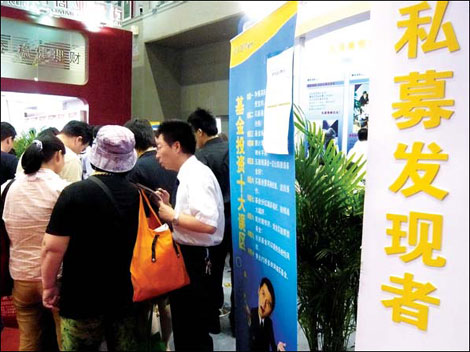By Lui Chun Fai
|

|
|
Investors gather in a fund house booth at the Beijing International Securities and Funds Expo held in May.
|
The Anti-monopoly Law came into effect on August 1, 2008, a week before the fireworks would appear for the Beijing Olympics. The law has attracted much publicity since its promulgation by the National People's Congress in August last year, which had culminated 13 years of legislative debate. A breathing space of 12 months between the time the law was passed and its effective date has enabled companies to review their business practices, and to ensure compliance under the new regulatory landscape.
Meanwhile, the economic landscape has witnessed considerable changes during the past 12 months. Against a backdrop of the sub-prime banking crisis in the United States that has spread across to Europe with banks writing down record figures as they battled with sour investments, sovereign funds have emerged as a new force to be reckoned with as they come to the rescue of financially distressed banks. China itself became a limited partner of Blackstone, and it has been announced that the Chinese social security fund will deploy monies into the private equity sector. With China continuing to be an attractive choice for foreign investors, how will the anti-monopoly legal regime impact the private equity houses ?
Risks or opportunities?
China, for all of its allure to foreign investors, also has an evolving legal and regulatory environment that can be tough to navigate. Unlike the old legislation, the Anti-monopoly Law will establish a regime with strict penalties and give the enforcement agency the power to strike down deals that pose monopolistic concerns. Will this spell more challenges for private equity funds?
The new regime will require an antitrust filing to be made if a transaction involves the acquisition of control or the ability to exercise decisive influence, and the turnover of the parties to the transaction exceeds certain amounts, or "filing thresholds" in antitrust jargon.
In many countries with long-established antitrust regimes, the turnover of private equity funds is calculated on an aggregate basis, which means the turnover of all portfolio companies that the fund has controlling interests would have to be added. Given the growing trend to raise bigger funds, with fund size in the billions of dollar becoming commonplace, private equity houses may find themselves crossing the filing thresholds and having to repeatedly make filings.
A private equity fund in Europe involved in a buyout of an American company would have to worry about antitrust clearance in China even if the parties are doing the deal outside China, as long as the transaction affects competition in the Chinese market. For high-profile transactions, especially those involving multinational corporations, the parties have to coordinate antitrust filings in various jurisdictions around the world that have merger control laws, such as the EU, United States, South America (in particular Brazil) and countries in Asia with antitrust laws like Korea and Japan. Leading antitrust lawyers around the world have echoed that China will become the next major piece of antitrust review of global transactions.
If a private equity house has to make a filing, then it cannot proceed with the transaction until the merger control authority has completed reviewing the case, and has made a decision. If a transaction poses monopolistic concerns, the enforcement agency can disapprove a transaction, or approve with conditions attached, such as requiring divestiture of certain assets in order to address anti-competitive concerns.
But what if a fund is investing in a sector which it has not made any investments in before, so there is no overlap with other portfolio companies of the fund? For example, if a fund whose portfolio is comprised mainly of telecommunications and IT companies decide to invest in a profitable maker of cheese? In such a case, if the private equity house is successful in arguing that it should not have to undertake merger filing in China (or for that matter other relevant jurisdictions) because the non-overlap does not create competition concerns, then it could have an edge against strategic buyers in competitive bidding when companies are being auctioned to potential buyers. A seller would prefer a private equity buyer if it can complete the deal and pay the price quickly, compared to another bidder which has to drag over a long time contending with antitrust regulators, like in the widely known GE-Honeywell case.
In contrast to the older legislation, the new regime obliges antitrust filings only if there is an acquisition of "control" or "decisive influence". While there are buyout funds and private equity houses favoring a controlling interest, there are other funds with a different investment strategy investing in minority stakes.
Thus, there are welcome changes under the Anti-monopoly Law. It will be interesting to see how the antitrust regime will evolve in China - like the Beijing Olympics, the whole world will be watching...
The author is a special counsel with Baker & McKenzie LLP.
(China Daily August 6, 2008)